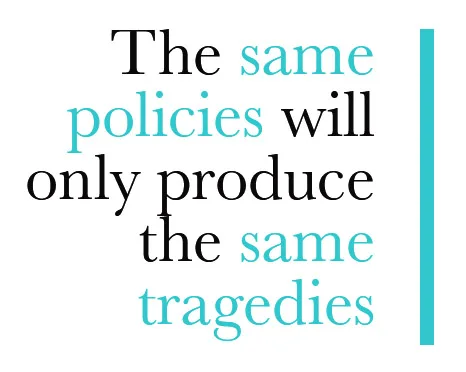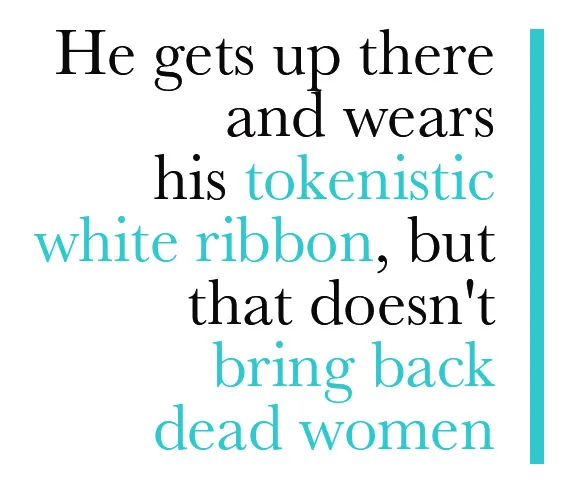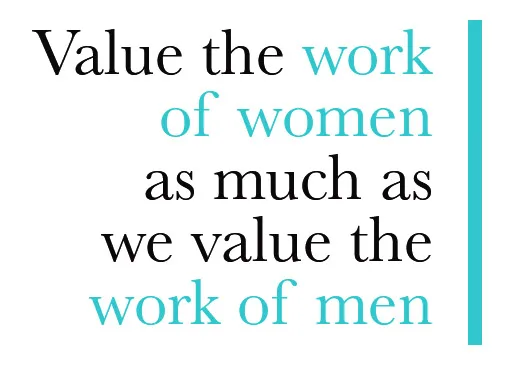In the 30 days of May so far, nine women have been killed in domestic violence-related incidents. And those are only the ones we know of.
These nine make it 27 women who have been murdered since the beginning of the year, an overwhelming amount by men they knew. In fact, the number one preventable contributor to death, disability and injury in women aged 18 – 44 is inflicted by a partner or former partner.
But despite those horrifying numbers, preventing domestic violence didn’t make Malcolm Turnbull’s five-point plan for 2018-19. One of the five commitments made by the government for their 2018-19 Budget was “keeping Australians safe”. This ostensibly manifested as increased counter-terrorism and international security measures rather than tackling Australia’s more deadly national security issue.
The Turnbull government pledged around $54 million to different aspects of domestic violence support—including elderly abuse which affects up to 20 per cent of elderly women and protecting against online abuse like “revenge porn”.
For comparison, Australia spent $100 million on the Sir John Monash interpretive centre at Villers-Bretonneux in Northern France to honour the 46,000 Australians who died on Europe’s western front. This is despite the fact no other country, including the UK and Germany, has spent as much money commemorating the First World War as Australia.
Despite the Budget’s glaring disparity on the two issues, Minister for Women Kelly O’Dwyer highlighted their pledge to making women feel safe in their homes and online.
“There is nothing more important than keeping women safe and their children safe,” Ms O’Dwyer told News Corp.
“The government is focused on providing support to women who have been subjected to violence and who have been victimised online.”
While advocates against domestic violence celebrated the pledging of money to these previously underfunded areas, some also accused the prime minister of being ‘all talk, no action’.
“We’re disappointed that specialist domestic violence services and community legal services are not receiving the funding they need,” Destroy The Joint, an organisation dedicated to tracking the number of women killed in Australia told Now To Love.
“Budgeting $48.7 million dollars for yet another Captain Cook Memorial compared to $54.4 million to combat domestic violence and elder abuse is a shameful reflection of the Turnbull government’s priorities.”
CEO of Melbourne’s Asylum Seeker Resource Centre (ASRC), Kon Karapanagiotidis, was similarly disgusted by the Budget’s pledge to first response teams.
“Malcolm Turnbull doesn’t care about women,” Karapanagiotidis asserted. “What other conclusion can you come to?”
“Yeah, he gets up there and wears his tokenistic white ribbon, but that doesn’t bring back dead women. Prevention saves women, and prevention needs funding.”
The amount pledged to domestic violence seems especially substandard when compared to amounts pledged by state-level governments. Last year, the Victorian government allocated $1.9 billion to the fight.
“There’s pretty good gender parity in the Victorian parliament which might be why that state has such a huge commitment to protecting Aussie women,” Karapanagiotidis acknowledged.

“They also have a premier [Daniel Andrews] that cares; he listened and wants it to change.”
Mr Andrews certainly does seem to care. The state Budget made sure to implement all 227 recommendations of the landmark Royal Commission into Family Violence.
“The same policies will only produce the same tragedies. That’s why I promised to change it all,” he said while introducing the “unprecedented” package.
Is the problem in the label?
Since 2001, six people—not including perpetrators—have been killed by terrorists on Australian soil. Even if you take into consideration the Australians that have died overseas in terror attacks, including the devastating Bali bombings in 2002, the number still pales in comparison compared to women murdered every week.
And yet, a 2016 ANU poll revealed more than half of the country’s adults are concerned we’ll be a target for terrorism.
Advocates for quashing domestic violence frequently discuss the problematic language surrounding assault when it comes to women.
With the Turnbull government focussing heavily on counter-terrorism, would rebranding domestic violence as domestic terrorism result in more funding?
“If we said this amount of women had died from of terrorism, we’d have the army on the street, curfews would be enforced, and we’d have 24 hour news saturation,” Karapanagiotidis told Now To Love.
“But on a systemic and structural level, it is terrorism, that’s what I don’t understand. Women are controlled by men who inflict a state of constant terror.
“Women are also paralysed by the knowledge they’re in the most danger when they try to leave these abusive, controlling situations. Sound like a kind of domestic terrorism to me,” he added.
Some believe calling it “domestic violence” rather than assault can legitimise the sense of private space, helping people to look away from what’s happening behind closed doors, but Destroy The Joint don’t necessarily agree.

“The term ‘domestic violence’ identifies our campaign as one that focusses on a specific type of violence,” they explained to Now To Love.
“Also, by associating the word ‘violence’ with ‘domestic’ or ‘family’, rather than minimising the violence [as some have suggested], it emphasises that it takes place within a relationship—a place where it’s reasonable to expect safety, respect and an absence of violence and control.”
“Perhaps the place where change needs to happen is not in the words, but in the legal response and consequences for perpetrators.”
What can we, as a society, do to help?
Most advocates agree a giant part of tackling this national emergency comes down to changing the societal norms that encourage misogyny.
“It’s in the readiness to blame victims for their victimisation instead of making perpetrators responsible for their wrongdoing,” Destroy The Joint cautioned.
“Comparing the numbers of male versus female murderers confirms that, by far, most violence against women is perpetrated by men.”
“Although it’s changing, societal misogyny gives men permission to control women with violence and gives women little option but to accept and even excuse the violence against them.
“It makes escape from violence a life-threatening experience which, even if achieved, is often an escape into poverty.”
As inherent as misogyny seems, it’s undeniably a learned trait and with education, we can save Australian women.
“Of course I used to have those traits,” Karapanagiotidis admitted. “Everyone does. And as a male, I worked really hard to unlearn them.”

“Discourage ‘boys will be boys’ attitudes,” Destroy The Joint advised. “Don’t do it. Value the men who don’t do it, call out those who do. Show true respect for women.”
Education doesn’t stop with kids though.
“Value the work of women as much as we value the work of men,” Destroy The Joint added. “Stop believing that all men in leadership roles got there by merit and women don’t measure up.
“Support closing the gender pay gap. Don’t tolerate sexual harassment. Expect and work with professionalism and treat women as colleagues, not as sex toys.”
The number of women dying every week is terrifying, but as 2016 Australian of the Year David Morrison said, “it’s not about the statistics”.
“We run the risk, at times, of being a nation of bystanders comforted by a few statistics,” he said.
“Let me tell you, there are people dying and people whose lives are absolutely ruined as a result of domestic violence and, what’s more, we are all, as a society, the victim.”
Remembering these women are just that—women, not numbers—was the same motivation Destroy The Joint had for starting their crusade.
“We started ‘Counting Dead Women’ because women’s violent deaths would otherwise typically be reported in isolation, one by one,” they told Now To Love.
“They would be news for a day, maybe a week or two if the death was sensational, then they would roll away into obscurity. One. One. One. One. We started counting because we want these deaths to count for something and to identify the size of the problem. One. Two. Three. Four… Twenty-six so far this year.
“Twenty-six in twenty-one weeks says so much more than one now and one a while ago, was it last week or the week before?
“We call on the government to implement an official national count of violence against women which includes all types of assault, deaths and information about perpetrators.”
Domestic violence is undeniably a national emergency, but the government has the power to stop it—we have the power to stop it.




